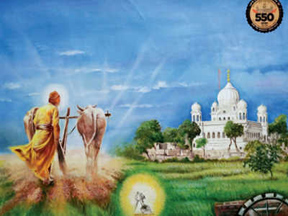

The ‘Kirat’ (endeavor) philosophy, the ethos of work-culture, espoused by Guru Nanak Dev Ji revolves around the basic concepts of honest earnings, compassionate sharing and remembrance of Divine Noumenon to remain in a blissful state of equipoise. Guruji lived his entire life, in consonance with these revolutionary principles, aimed at Good of All. He ensured that such Divine Tenets reached the masses, even if he to encounter the ruthlessly tyrannical rulers of his times. He lived his last many years at Kartarpur in present-day Pakistan, where he kept himself busy with agricultural activities, of course in addition to his regular congregations pertaining to his spiritual inclinations. By maintaining such an ideal lifestyle, Guru Sahib set an exemplary precedent for his disciples who were Sikhs, Hindus and Muslims, who looked up to him as their role-model, not merely at the human level but also as their spiritual mentor. ‘Guru Nanak farming’ soon became an enjoyable ‘bliss-laboratory’, for the enthusiastic householders, who loved their farmlands, protected and befriended the animals and birds, harvested crops to be used for their families as also to provide fodder for other creatures. And all crops were gotten organically, sans the usage of any fertilizers and chemicals. All the time, they enjoyed the company of cattle, butterflies, birds, honeybees. And, not to forget the fish in the ponds. All of this was not merely earning a livelihood but an entirely soul-soothing and a spirit-rejuvenating unique lifestyle, connecting them with The Divine One in every creature of Our Creator. The Guru proclaimed, “air is the Guru, water is the father, earth is the mother”.
In present-day Punjab, the culture of Kirat is totally devastated. Farmlands have turned barren deserts. The water-table is fast receding. Manure, chemicals and pesticides have ruined the soil. Farming has been reduced to a business accruing massive losses. The farmer is becoming an ailing victim of the menace of killer-cancerous and other diseases. Mother earth has lost its naturally characteristic nutrient values. While burning the futile remnants of some crops, the farmers fail to realize that they are burning innumerable earth-friendly worms and also impacting the existence and subsistence of several species of birds. Today, the already critical situation has reached a point where the initially nature-lover farmer is on the precipice of a catastrophe, having been driven to embrace death, by taking recourse to suicide. Decades of manipulative machinations by the corporate sector have eaten at the roots of the life of the populace and life of earth. Looking to increase yields and profits, the farmers have ended up, burdened by mountains of loans culminating in traumatic mental, emotional and psychological ailments.
Toiling on their farmlands has, always, been the ideal and pivotal way of life for all Punjabis. However, such a lifestyle has, apparently, evaporated from Punjab, the granary of India, once upon a time. It is the end of a bygone Golden-Era. The youth are, especially, increasingly distancing themselves from Kirat traditions and culture. The youth are replacing the agricultural implements with their new acquisitions, the ‘ornamental’ motorbikes and cellular phones and are flaunting a totally different kind of lavish lifestyle. The youth have been misguided towards a destructive destination, by elements inimical to the affluence of Punjabis in various spheres of endeavor. Earlier in 1947, millions of Punjabis were made sacrificial lambs and slaughtered at the altar of ugly, sinister politics. The survivors were devoid of their lands. After a breather-of-sorts, arrived 1984 when the hearts and souls of Punjabis were, once again, tortured and several thousands were killed or made to disappear without a trace, during the era of Naxalite and wave of Militancy. Those who were happily treading on the progressively Divine-Path, illumined by Guru Nanak, with the objective of helping many others are left in a destitute and reclusive plight. The appetite of the ‘killer-machine’ was not satiated and then the 6th river of drug-menace was created in the land of 5 natural-rivers, the land which was once blessed by the touch of the sacred feet of several Divine Persona, Gurus, saints, seers, scholars. The famed river ‘White-Bein’ in Sultanpur Lodhi, associated with Guru Nanak Sahibji, has been polluted beyond imagination.
Guru Nanak Sahibji and his disciples had not envisioned such a destructive life replete with environmental pollution and corruptible humanity which enjoys the ruination of fellow humans and extinction of other species from planet earth. The texture of the social-fabric has been fragmented due to the twin-diseases of religious-divide and differences of caste-creed. Politicians rule the roost, to accumulate limitless wealth, at the expense of the life of millions, whose blood is being sucked, verily similar to how Guru Nanak Sahibji had given the description of his times, through his Sacred Gurbaani.
During the final-leg of the life-journey of Guru Nanak Sahibji emphatically stressed upon the paramount significance of ‘Sangat & Pangat’ (congregation and community-kitchen) by inspiring his disciples to adopt this way of life. Guru Sahibji shared all the crops, fruits and vegetables with the community. Guru Sahibji practiced equality, justice and fair-play, by involving the community in the farming activities, thereby laying the foundations of farm-communes, living in peace and harmonious coexistence. This was an exceptionally revolutionary concept, five centuries ago. Profits were shared as in a cooperative society or organization, wherein each primary member has the right to equal shares or units. This measure, initiated by The Guru, ensured the empowerment of the downtrodden segments of society, including those who were economically weak, the suppressed womenfolk deprived of their rights by dominant males in the family and the oppressed so-called low castes. Such decisions paved the way for everyone to live with dignity, security and in peace. Women started enjoying respect and they regained self-esteem. Gurbani laments about the castigation and oppression suffered by women, thus: “why ridicule a woman? from a woman, man is born; within a woman, man is conceived; to a woman, he is engaged and married’’.
Guru Nanak Devji undertook pedestrian Holy Journeys (Udaasiaan) in four directions, travelling thousands of miles, with the objective of having progressively meaningful discussions with decision makers, the clergy, saints and seers from divergent belief systems, while putting forth his own philosophy, in an open exchange of views. Although his family background was not related to agriculture, yet Guru Nanak took to farming during the last several years of his life. His father, Shri Kalyaan Daas ji was responsible (as the Patwaari) for maintaining the financial records of Rai Bulaar, the Muslim ruler of Talwandi. His family also owned substantial lands. Guru Nanak, in his youthful years, was employed as a storekeeper. However, he adopted farming as his vocation, during his final years, considering the need of the hour to make the people self-reliant, by motivating many to take to farming. Guru ji mentions various crops in his Gurbaani, while using them as metaphors, for instance writing about wheat, rice, cotton, coconut, mango, sunflower, sugarcane, varieties of trees, and also about his love for animals and birds. Guru Nanak had a soft corner for ecology and preached about conservation of the environment.
However, today, Punjab, Punjabis, their farmlands and farming profession are, all, facing an identity-crisis. The rulers, in connivance with the corporate, are bent upon usurping the farmlands, thereby rendering the farmers totally destitute going into a state of pain and penury. The progressive Vision and Legacy of Guru Nanak Ji is not being honored. Three black laws have been enacted targeting towards monopolizing farming in the hands of the corporate world, who are already ultra rich. To register their vociferous protest against the deceptive, cruel laws, lakhs of farmers have been braving the extremities of weather and atrocities of authorities, sitting on various borders of Delhi, for the past one year. During this long phase of struggle, between 600 and 700 old and young farmers have succumbed to the vagaries of nature or have been tortured by the elite. The conspiracy against the farmers is being exposed. Their voices of anguish are falling on deaf ears but the ‘Sons of the Soil’ are relentless in waging a Peaceful-War, toregain their birthright to hold on to their soil and their heritage. Five centuries ago, Guru Nanak had proclaimed, during a direct encounter with the ruthless, tyrannical Mughal Babur: “kings are hungry lions; their servants, rabid dogs. They are foes of soothing restful sleep; they are mindless servile cogs. The lackeys of the evil king; waving talon and claw. They prey on common gentlefolk; their tender flesh they gnaw”. The Guru lamented the miserable plight of the defenseless populace, saying “O’ Lord, don’t You feel the pain of the weak and the meek, who are being crushed, ruthlessly”.
The scenario, today, is akin to the situation during the life and times of Guru Sahibji. Yet, the factor of consolation is that the Divine Legacy and Sacred Tenets of Guru Nanak’s philosophy have remained engrained in the psyche of the masses and they are not surrendering before the oppressors and are fighting the battle, valiantly. Rising over and above the distinctions and differences of caste, creed, religion, region, the farming sector has formed a formidable alliance. Abiding by the Divine Teachings of Guru Nanak Sahib, such staunch sense of resilience of the farmers shall, most certainly, fructify into eventual success and the victors shall be empowered to stop the migration of their youngsters, who have been going abroad in large numbers.
(The author is a retired Principal. He can be reached at gurmitpalahi@yahoo.com)
(Translated from Punjabi by Amarjit Singh Anand)




Be the first to comment